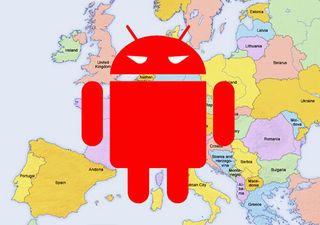Google Just Fined $5 Billion for Abusing Android Dominance
The European Union has slapped Google with a record-setting fine, and the company could be forced to change Android phones forever.
Google is in some hot water, and it's not just about a record-setting fine.
The European Union on Wednesday (July 18) slapped Google with a whopping $5.06 billion fine for allegedly abusing its position as the dominant mobile smartphone operating system maker.

Google was also ordered to change business practices to ensure fairer competition in the European mobile market. It's the biggest fine ever levied on a tech company — a record Google previously held when it was fined about half that last year.
In a statement, European Commission competition watchdog Margrethe Vestager said that Google engaged in three activities that her office believes violate competition rules. Those activities included requiring smartphone manufacturers to pre-install Google Search and Chrome on their devices in order to use Google's Play marketplace; paying smartphone makers and mobile network operators to only pre-install Google Search on devices; and preventing manufacturers from selling any devices that were running alternative Android versions that weren't approved by Google.
MORE: Huh? Microsoft Could Be Making an Android Phone
"Our case is about three types of restrictions that Google has imposed on Android device manufacturers and network operators to ensure that traffic on Android devices goes to the Google search engine," Vestager said in a statement. "In this way, Google has used Android as a vehicle to cement the dominance of its search engine. These practices have denied rivals the chance to innovate and compete on the merits. They have denied European consumers the benefits of effective competition in the important mobile sphere. This is illegal under EU antitrust rules."
Huge Impact Beyond Fine
Sign up to get the BEST of Tom's Guide direct to your inbox.
Here at Tom’s Guide our expert editors are committed to bringing you the best news, reviews and guides to help you stay informed and ahead of the curve!
In its justification for the historic fine, the EU's competition watchdog said it's based on the "duration and gravity of the infringement." But the fine itself might not be Google's biggest concern.
In addition to the fine, Vestager's office wants Google to change its business practices. It can no longer engage in the three violating activities. That would mean Android device makers would no longer need to pre-install Google Search and Chrome in Android. Google would also need to stop preventing forked Android versions from coming to the market without its approval.
The move could have a profound impact on Google, which derives significant revenue from the advertising it derives from Android devices. If mobile device makers use Android but turn their backs on Google services, Android might stop being as much of a cash cow for the company.
MORE: Best Android Phones - Top Rated Smartphones You Can Buy
A Worrying Dominance
Google is the dominant force in mobile operating systems in Europe and abroad. And competitors, including Microsoft and others, have argued that Google's dominant place as the go-to option for smartphone makers to obtain an operating system could limit competition. They point to the Chrome browser being pre-installed in Android and Google Search turned on by default as potentially concerning.
In its opinion, the EU called Google dominant in "general Internet search services, licensable smart mobile operating systems, and app stores for the Android mobile operating system." And while being dominant alone isn't illegal, abusing that power is. And Google, through its relations with companies, has been abusing its power, the EU claims.
MORE: 14 Biggest New Android P Features
In the case of pre-installing Search and Chrome in Android, Vestager's office said that Google has created a "status quo bias." It argues that if users see pre-installed browsers and search, they simply use those services to the detriment of all others. In that case, Google called tying its services to Android "necessary" to help it monetize its Android investment, since the operating system is open source and free. The EU didn't believe that argument held water.
"Google's practices also harmed competition and further innovation in the wider mobile space, beyond just internet search," the Commission said in a statement. "That's because they prevented other mobile browsers from competing effectively with the pre-installed Google Chrome browser. Finally, Google obstructed the development of Android forks, which could have provided a platform also for other app developers to thrive."
Google Denies Wrongdoing
Of course, Google denies the EU's contention and will likely do everything it can to appeal the decision. But Google has 90 days to stop its business practices and will face EU monitoring going forward.
In addition to the fine, Google could be forced to pay up to 5 percent of its average daily worldwide revenue for violating the agreement Vestager's office hopes to make with the company. Worse yet, that 5 percent is on all the revenue of Google's parent Alphabet and not just the revenue it generates on Android.
Google plans to issue a statement later today.
Don Reisinger is CEO and founder of D2 Tech Agency. A communications strategist, consultant, and copywriter, Don has also written for many leading technology and business publications including CNET, Fortune Magazine, The New York Times, Forbes, Computerworld, Digital Trends, TechCrunch and Slashgear. He has also written for Tom's Guide for many years, contributing hundreds of articles on everything from phones to games to streaming and smart home.
